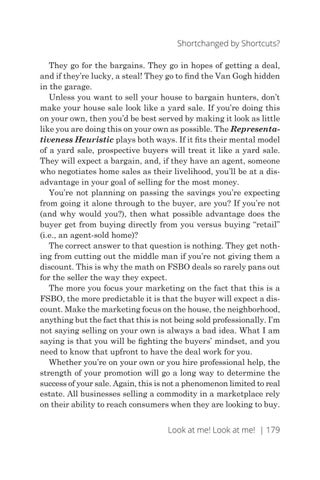Shortchanged by Shortcuts? They go for the bargains. They go in hopes of getting a deal, and if they’re lucky, a steal! They go to find the Van Gogh hidden in the garage. Unless you want to sell your house to bargain hunters, don’t make your house sale look like a yard sale. If you’re doing this on your own, then you’d be best served by making it look as little like you are doing this on your own as possible. The Representativeness Heuristic plays both ways. If it fits their mental model of a yard sale, prospective buyers will treat it like a yard sale. They will expect a bargain, and, if they have an agent, someone who negotiates home sales as their livelihood, you’ll be at a disadvantage in your goal of selling for the most money. You’re not planning on passing the savings you’re expecting from going it alone through to the buyer, are you? If you’re not (and why would you?), then what possible advantage does the buyer get from buying directly from you versus buying “retail” (i.e., an agent-sold home)? The correct answer to that question is nothing. They get nothing from cutting out the middle man if you’re not giving them a discount. This is why the math on FSBO deals so rarely pans out for the seller the way they expect. The more you focus your marketing on the fact that this is a FSBO, the more predictable it is that the buyer will expect a discount. Make the marketing focus on the house, the neighborhood, anything but the fact that this is not being sold professionally. I’m not saying selling on your own is always a bad idea. What I am saying is that you will be fighting the buyers’ mindset, and you need to know that upfront to have the deal work for you. Whether you’re on your own or you hire professional help, the strength of your promotion will go a long way to determine the success of your sale. Again, this is not a phenomenon limited to real estate. All businesses selling a commodity in a marketplace rely on their ability to reach consumers when they are looking to buy. Look at me! Look at me! | 179
Issuu converts static files into: digital portfolios, online yearbooks, online catalogs, digital photo albums and more. Sign up and create your flipbook.




